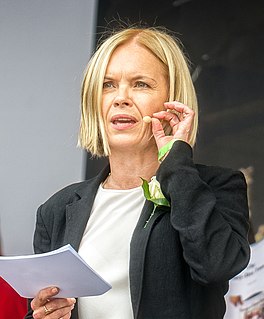A Quote by Mariella Frostrup
Emotions are products of our mind, and we can actually train ourselves to choose whether we banish or embrace them.
Related Quotes
It's not a matter of how much you know or can define, or how many millions of mantras or thousands of prostrations you have done, or how many months of wangs you've attended. The important thing is whether or not the mind is really changing, whether our negative emotions are really coming under control, whether we are really beginning to understand ourselves, whether our mind is really improving, and whether in our hearts there is genuine love and caring for other people.
Even as the government dominates the headlines, private entrepreneurs are busy every day working to improve products and services that improve our lives. They do it without taxing us or regulating us, or making us suffer through tedious elections or political debates. They make their products and offer them to us in a way that pleases the consuming public the most. We can choose whether we want them or not.
In the space between stimulus (what happens) and how we respond, lies our freedom to choose. Ultimately, this power to choose is what defines us as human beings. We may have limited choices but we can always choose. We can choose our thoughts, emotions, moods, our words, our actions; we can choose our values and live by principles. It is the choice of acting or being acted upon.
All men and women are born, live, suffer and die; what distinguishes us one from another is our dreams, whether they be dreams about worldly or unworldly things, and what we do to make them come about... We do not choose to be born. We do not choose our parents. We do not choose our historical epoch, the country of our birth, or the immediate circumstances of our upbringing. We do not, most of us, choose to die; nor do we choose the time and conditions of our death. But within this realm of choicelessness, we do choose how we live.
Television screens saturated with commercials promote the utopian and childish idea that all problems have fast, simple, and technological solutions. You must banish from your mind the naive but commonplace notion that commercials are about products. They are about products in the same sense that the story of Jonah is about the anatomy of whales.
When we ignore the prostituted child, we actually lend our hand to their abuse. When we ignore the widow and the orphan in their distress, we actually add to their pain. When we ignore the slave who remains captive, it's us who is entrapping them. When we forget the refugee, it's actually us who is displacing them. When we choose not to help the poor and the needy, we actually rob them. Perhaps the only fair thing to say is that when we forsake the lives of others, we actually forsake our own.
We might not know we are seeking people who best enrich our lives, but somehow on a deep subconscious level we absolutely are. Whether the bond is temporary or permanent, whether it succeeds or fails, fate is simply a configuration of choices that combine with others to shape the relationships that surround us. We cannot choose our family, but we can choose our friends, and we sometimes, before we even meet them.

































